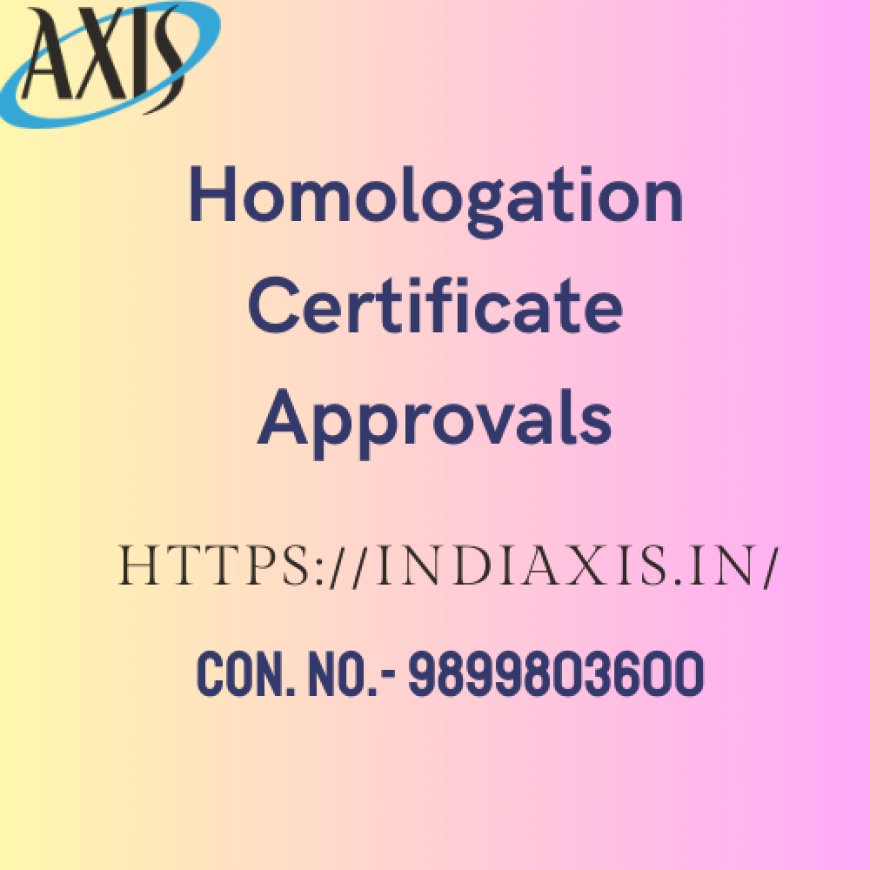Homologation Certificate Approvals

Homologation is a critical process in various industries, ensuring that products meet regulatory and safety standards before they are introduced to the market. One of the key components of this process is obtaining Homologation Certificate Approvals, which serve as official confirmation that a product complies with the relevant national or international standards. These approvals are essential for businesses that manufacture and distribute vehicles, electronic devices, medical equipment, and other regulated products.
What is Homologation?
Homologation is the process of certifying that a product meets the required technical, safety, and environmental standards established by regulatory authorities. This process is particularly relevant in industries such as automotive, telecommunications, and consumer electronics. The primary objective of homologation is to ensure that products are safe for use, meet industry regulations, and can be legally sold in specific markets.
Understanding Homologation Certificate Approvals
Homologation Certificate Approvals are official documents issued by regulatory agencies or certification bodies, confirming that a product complies with applicable standards. These certificates are required before a product can be sold, imported, or distributed in various markets. The approval process typically involves testing, evaluation, and documentation to demonstrate compliance with specific requirements.
Industries That Require Homologation Certificate Approvals
-
Automotive Industry
The automotive sector is one of the most regulated industries, requiring homologation for vehicles, components, and accessories. Regulatory bodies such as the Economic Commission for Europe (ECE), the Federal Motor Vehicle Safety Standards (FMVSS) in the U.S., and the Bureau of Indian Standards (BIS) in India oversee homologation requirements. Without the necessary Homologation Certificate Approvals, a vehicle or its parts cannot be legally sold or registered in many countries. -
Telecommunications and Electronics
Devices such as smartphones, Wi-Fi routers, and broadcasting equipment must undergo homologation to ensure compliance with electromagnetic compatibility (EMC) and radio frequency (RF) standards. Organizations like the Federal Communications Commission (FCC) in the U.S. and the European Telecommunications Standards Institute (ETSI) regulate these approvals. -
Medical Devices
Medical equipment must meet stringent regulatory requirements to ensure patient safety and functionality. The Homologation Certificate Approvals for medical devices involve compliance with standards set by authorities such as the U.S. Food and Drug Administration (FDA), the European Medicines Agency (EMA), and the International Electrotechnical Commission (IEC). -
Construction and Industrial Equipment
Machinery and industrial equipment must be homologated to comply with safety, environmental, and operational regulations. Certification is often required to meet standards such as ISO (International Organization for Standardization) and CE (Conformité Européenne) marking in Europe.
The Homologation Process
The process for obtaining Homologation Certificate Approvals varies by industry and country, but it typically involves the following steps:
-
Regulatory Research
Manufacturers must identify the specific standards and regulatory requirements applicable to their product in the target market. -
Testing and Evaluation
Products are subjected to rigorous testing in accredited laboratories to ensure compliance with performance, safety, and environmental standards. -
Documentation and Submission
A comprehensive technical file, including test reports, design specifications, and risk assessments, is submitted to the relevant certification body. -
Review and Certification
The regulatory authority evaluates the submitted documents and test results. If the product meets all requirements, the Homologation Certificate Approvals are issued. -
Market Surveillance and Compliance Maintenance
Even after approval, ongoing compliance is required. Authorities may conduct periodic inspections and audits to ensure continued adherence to regulations.
Challenges in Obtaining Homologation Certificate Approvals
While obtaining Homologation Certificate Approvals is essential for market access, the process can be complex and time-consuming. Some of the key challenges include:
- Evolving Regulatory Requirements: Standards and regulations frequently change, requiring manufacturers to stay updated on compliance requirements.
- High Testing Costs: Extensive testing and certification fees can be costly, especially for small and medium-sized enterprises (SMEs).
- Time-Consuming Procedures: The homologation process can take several months, delaying product launches and market entry.
- Global Variability: Different countries have distinct homologation requirements, making it necessary for manufacturers to obtain multiple certifications.
Benefits of Homologation Certificate Approvals
Despite the challenges, obtaining Homologation Certificate Approvals offers several benefits, including:
- Market Access: Certification allows manufacturers to sell their products legally in multiple markets.
- Consumer Trust: Products with homologation approvals are perceived as safer and more reliable.
- Legal Compliance: Avoids penalties, recalls, and legal complications associated with non-compliance.
- Competitive Advantage: Certified products can differentiate themselves from uncertified competitors.
Conclusion
Homologation Certificate Approvals are an essential part of regulatory compliance for various industries. The certification process ensures that products meet the necessary standards for safety, quality, and performance, facilitating legal market entry and consumer trust. While obtaining homologation approvals can be complex and time-consuming, the benefits far outweigh the challenges. By understanding the homologation process and staying informed about regulatory requirements, manufacturers can streamline approvals and successfully bring their products to market.
What's Your Reaction?


























